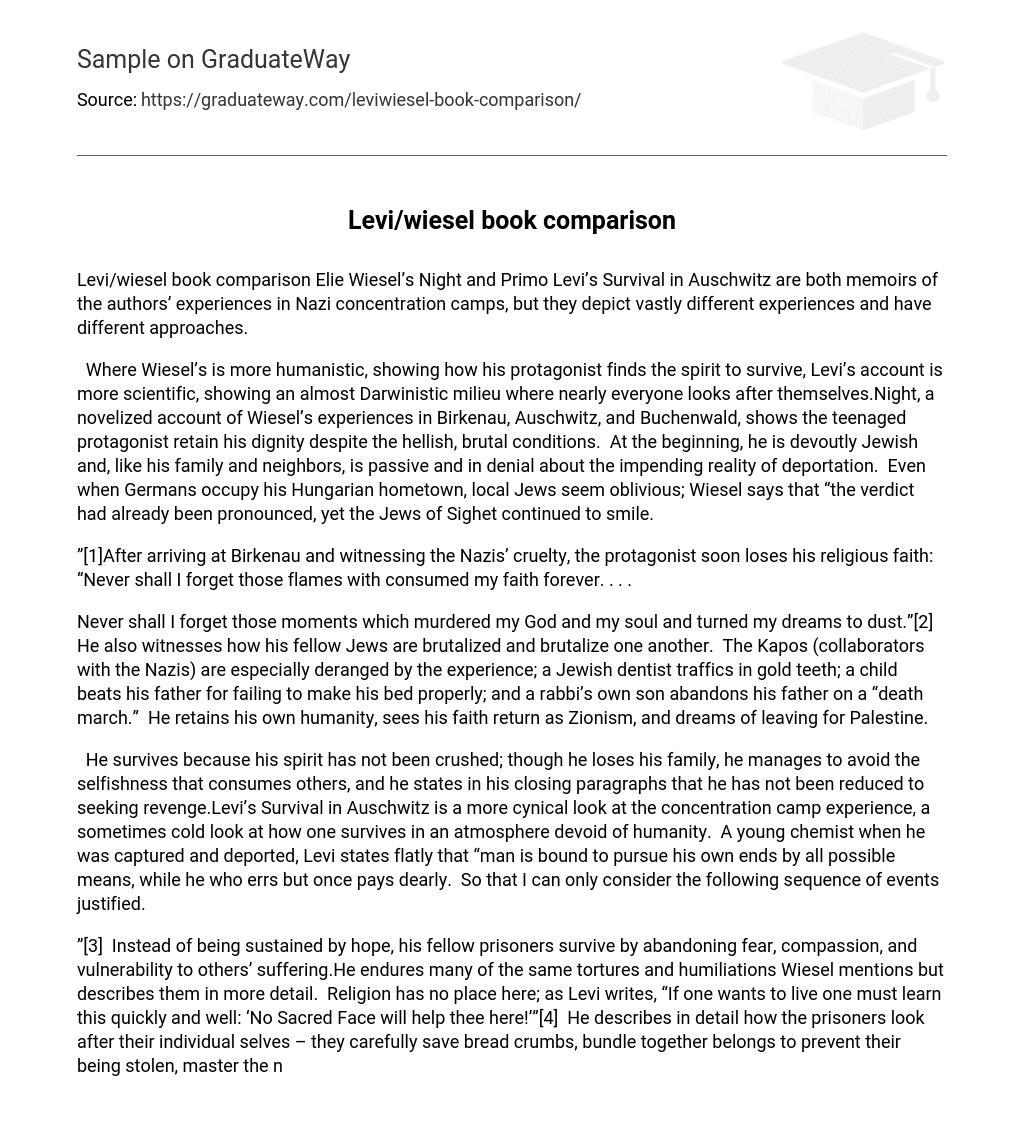Elie Wiesel’s Night and Primo Levi’s Survival in Auschwitz are both memoirs of the authors’ experiences in Nazi concentration camps, but they depict vastly different experiences and have different approaches. Where Wiesel’s is more humanistic, showing how his protagonist finds the spirit to survive, Levi’s account is more scientific, showing an almost Darwinistic milieu where nearly everyone looks after themselves.
Night, a novelized account of Wiesel’s experiences in Birkenau, Auschwitz, and Buchenwald, shows the teenaged protagonist retain his dignity despite the hellish, brutal conditions. At the beginning, he is devoutly Jewish and, like his family and neighbors, is passive and in denial about the impending reality of deportation. Even when Germans occupy his Hungarian hometown, local Jews seem oblivious; Wiesel says that “the verdict had already been pronounced, yet the Jews of Sighet continued to smile.
Never shall I forget those moments which murdered my God and my soul and turned my dreams to dust.” He also witnesses how his fellow Jews are brutalized and brutalize one another. The Kapos (collaborators with the Nazis) are especially deranged by the experience; a Jewish dentist traffics in gold teeth; a child beats his father for failing to make his bed properly; and a rabbi’s own son abandons his father on a “death march.” He retains his own humanity, sees his faith return as Zionism, and dreams of leaving for Palestine.
He survives because his spirit has not been crushed; though he loses his family, he manages to avoid the selfishness that consumes others, and he states in his closing paragraphs that he has not been reduced to seeking revenge.Levi’s Survival in Auschwitz is a more cynical look at the concentration camp experience, a sometimes cold look at how one survives in an atmosphere devoid of humanity. A young chemist when he was captured and deported, Levi states flatly that “man is bound to pursue his own ends by all possible means, while he who errs but once pays dearly. So that I can only consider the following sequence of events justified.
Instead of being sustained by hope, his fellow prisoners survive by abandoning fear, compassion, and vulnerability to others’ suffering.He endures many of the same tortures and humiliations Wiesel mentions but describes them in more detail. Religion has no place here; as Levi writes, “If one wants to live one must learn this quickly and well: ‘No Sacred Face will help thee here!’” He describes in detail how the prisoners look after their individual selves – they carefully save bread crumbs, bundle together belongs to prevent their being stolen, master the numerous complicated camp rules, and stay as fit as possible despite starvation and disease. The prisoners often treat each other coarsely, even cruelly, but he explains that “in the face of driving necessity and physical disabilities many social habits and instincts are reduced to silence” and that “everyone is desperately and ferociously alone.
Kindness simply has no place here.In comparing the two works, Wiesel presents an account of hope and dignity, showing how one can keep their humanity in the face of degradation. His account does not deny the brutality and betrayals, but it concentrates on how keeping one’s spirit alive can help one endure. Levi’s story shows the brutalization and debasement in more detail, showing how the illogical cruelty of camp life makes some survive through selfish resourcefulness. Both are valuable for demonstrating the importance of determination and dignity in a setting where staying alive is tantamount to all else.
BIBLIOGRAPHY
- Levi, Primo. Survival in Auschwitz. New York: Touchstone, 1996.
- Wiesel, Elie. Night/Dawn/Day. Northvale NJ: Jason Aronson Inc., 1985.





